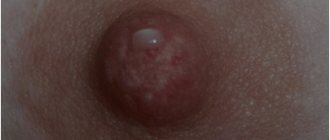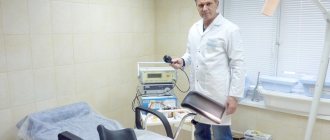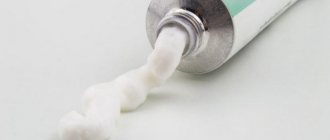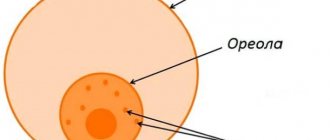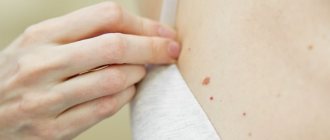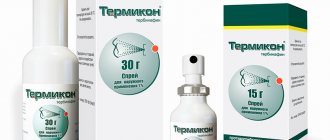Obsessive itching in the anal canal is a symptom that is rarely addressed to a doctor. It is considered inconvenient, sometimes indecent, and is often ignored. Meanwhile, itching near the anus or inside it does not occur for no reason. It may hide a serious intestinal or rectal disease, endocrine disorders and parasites.
To say goodbye to unbearable itching in an “inconvenient place” once and for all, you need to find out the reasons for its occurrence, and then select effective treatment methods.
Prices for services
Initial appointment with a proctologist (assessment of patient complaints, medical history, external examination of the anus, digital examination of the rectum, anoscopy if indicated)
Primary appointment – visiting a doctor of a specific specialty for the first time. Make an appointment
1170 ₽ 1500 ₽
Repeated appointment with the proctologist
Make an appointment
550 ₽ 700 ₽
Severe itching and burning in the anus are characteristic of the following diseases and conditions:
- internal and external hemorrhoids, proctitis, paraproctitis;
- genital warts in the perianal region and rectal mucosa;
- acute and chronic anal fissure;
- fistula tracts in the anus;
- failure of the anal sphincter and involuntary contact of rectal contents with the skin of the perianal area;
- perianal dermatitis;
- inflammatory bowel diseases (ulcerative colitis, Crohn's disease, etc.);
- dermatological diseases (psoriasis, eczema);
Intestinal diseases
Intestinal pathologies are the most common cause of anal scabies. Diseases of the lower gastrointestinal tract include:
- hemorrhoids external/internal;
- genital condylomas;
- cracks and mechanical damage;
- oncological tumors.
With pathologies of the rectum, the symptoms will be constant and increasing. In addition to itching, sharp stabbing pains that intensify in a sitting position and when going to the toilet can be bothersome.
Primary and secondary anal itching
Anal itching can be primary or secondary. Secondary anal itching is a symptom of diseases such as anal fissure, hemorrhoids, helminthic infestations, anal sphincter insufficiency, proctosigmoiditis, intestinal disorders (constipation, diarrhea), genital inflammation, skin fungus in the sacrococcygeal region, exposure to allergens. Anal itching may indicate hidden diabetes. The causes of primary anal itching, which experts also call true, are not fully known.
What diseases cause anal itching?
Anal itching may be accompanied by the following diseases:
- proctological direction (proctitis and proctosigmoiditis, hemorrhoids, chronic paraproctitis, cryptitis, insufficiency (incontinence) of the anal sphincter);
- gynecological direction (PID);
- viral direction (genital warts);
- fungal diseases (actinomycosis, thrush);
- bacterial diseases (helminthic infestations, pubic lice, scabies);
- skin diseases (psoriasis, seborrhea, inflammation of the sweat glands, atopic dermatitis, eczema, lichen planus);
- diseases with metabolic disorders (diabetes mellitus, liver failure, pancreatitis).
Acute and chronic anal itching
There are acute and chronic primary anal itching, and the form of the disease is also its stage. Anal itching in acute form begins suddenly, has a constant course and strength, the skin in the areas of itching becomes moisturized, traces of scratching and an increase in perianal folds are observed. Chronic itching, on the contrary, is characterized by a slow onset, the skin of the perianal area is dry, thin, has altered pigmentation, scratch marks are absent or look like thin linear abrasions, skin folds are poorly defined.
Reviews
I suffered from anal itching for 9 years. I went to the surgeon for a referral to a proctologist. The surgeon gave directions for tests. Everything is okay. The proctologist (in my case) said that itching of the anus could be an allergic reaction to foods (sweets, citrus fruits, coffee, alcohol, etc.).
Prescribed Triderm or Celestoderm ointment. I decided to save money, bought Akriderm, started smearing it, the itching went away after 4 days, but be sure to smear it at night for 1 month. Hurray-Hurray-Hurray!!!!!!!!! Maybe it will help you, it’s inexpensive - 130 rubles. At certain times, a proctologist can see you for a fee without a referral. Find out.
Itching and burning in the anus in women
Anal itching and burning in women, in addition to causes characteristic of both sexes, can be caused by gynecological diseases: candidiasis, vaginitis, hormonal disorders while taking combined oral contraceptives, menopausal changes, atrophy of the vaginal mucosa, inflammation of the glands of the vestibule of the vagina, etc.
The presence of the above symptoms in women is often a consequence of pregnancy and childbirth due to the occurrence of postpartum hemorrhoids and anal fissures; is further complicated by the fact that intestinal motility in the “weaker” sex is less pronounced than in men, as a result of which women more often suffer from constipation and irregular bowel movements.
Make an appointment
Preventive measures
A few simple tips:
- After defecation, you should wash yourself or use wet wipes; rough paper or paper with strong fragrances can cause irritation or allergies,
- It is very important to maintain hygiene: the anal area, which is constantly warm and in contact with feces, must be clean, otherwise microbes and fungi will begin to multiply intensively,
- Healthy stool and sufficient physical activity will help you avoid hemorrhoids.
- Washing your hands and food before eating and limiting contact with unfamiliar animals will help reduce the possibility of infection with worms to zero.
Following these simple rules will reduce the likelihood of diseases manifested by anal itching. If it nevertheless begins to interfere with your life, you should consult a doctor without hesitation and without wasting time, which in some situations may turn out to be precious.
Diagnostics
The choice of diagnostic research methods depends on the nature of the disease and the presence of additional symptoms in the patient. Timely consultation with a coloproctologist to determine the cause of itching and burning and make a diagnosis - preventing possible complications. To diagnose itching and burning in the anus, various instrumental and laboratory research methods are used.
- Collecting complaints from the patient and compiling a medical history to clarify information about the nature of itching and burning, duration, intensity, relationship with eating disorders and other factors.
- External examination of the perianal area: assessment of signs of inflammation, the presence of scratches, abrasions, cracks, and any formations.
- Scraping material from the perineum for analysis of helminthiasis and helminthic infestation.
- Internal digital rectal examination.
- Anoscopy.
- If any symptoms from the gastrointestinal tract are detected: bacteriological analysis of stool, sigmoidoscopy, irrigoscopy, fibrocolonoscopy; for complaints of abnormal stool, abdominal pain - fibrogastroduodenoscopy and ultrasound of the abdominal cavity.
- In case of functional insufficiency of the anal sphincter, sphincteromanometry is performed.
When consulting a woman with complaints of itching and burning in the anus, a consultation with a gynecologist may be recommended to rule out diseases of the genitourinary system.
When a man comes to you with symptoms in the form of anal itching and burning, it is possible to consult a urologist and conduct a differential diagnosis.
Why there is itching in the anus - the main reasons
If you have complaints about anal itching, you can contact your doctor. After an initial examination, he will refer the patient to a specialist - a proctologist, gastroenterologist, infectious disease specialist, urologist or gynecologist. The patient may have to consult several specialists and undergo several tests.
At the initial stage of diagnosis, the doctor will consider specific symptoms, based on which it can be assumed that as a result of itching in the anal area. There are several dozen diseases with this symptom.
Pathologies of the rectum
The most common cause of itching in the anus in adults is diseases of the rectum. These include:
- external or internal hemorrhoids;
- chronic proctosigmoiditis;
- neoplasms in the rectum (polyps or cancerous tumors);
- neoplasms in the folds of the anus and around the anus (genital warts);
- anal fissures;
- anorectal fistulas.
If the itching around the anus is not accompanied by mucus and blood, and upon examination dry, flesh-colored formations are found, we are talking about genital warts.
Important! Benign neoplasms appear due to infection with the human papillomavirus (HPV). Under certain conditions, this infection provokes the formation of perianal condylomas and papillomas, which can then develop into anal canal cancer.
If, in addition to itching, the patient complains of pain in the rectum, discharge of blood and mucus, there is a high probability of proctological diseases - fissures, hemorrhoids, fistulas, etc. Unpleasant symptoms in such diseases worsen after defecation.
Pathologies of the genitourinary system
Itching around the anus can occur against the background of gynecological and urological diseases and infections of the genitourinary organs. The most common reasons for its appearance:
- candidiasis;
- chlamydia;
- trichomoniasis;
- gonorrhea and other STDs.
Sometimes it can be sexually transmitted herpes. You can recognize it by its watery bubbles (photo below).
There may be no signs other than itching in such pathologies. However, in most cases, they are indicated by discharge from the genital tract (green or purulent, in the form of foam or cottage cheese, mixed with blood, etc.), an unpleasant odor from the genitals, pain in the lower abdomen, rashes and weeping sores.
Important point! The mentioned diseases in 90% of cases are accompanied by enlarged lymph nodes in the groin. Sometimes this is the only sign, other than itching, that helps the doctor make the correct diagnosis.
Parasitic infections
The second most common cause of itching in the anus is infection with intestinal parasites - pinworms, roundworms, giardia. They are more likely to bother children and adolescents, causing severe discomfort after bowel movements and upon waking up. Additional signs by which helminthic infestations can be diagnosed:
- fatigue;
- drowsiness;
- allergic reactions (rash, runny nose);
- low-grade fever;
- nausea and/or vomiting;
- bloating;
- intestinal spasms and stool upset.
With ascariasis and enterobiasis, live or dead parasites are observed in the feces. Pinworms can be found near the anus on the skin or even on underwear. They especially often come out at night or in the morning.
Interesting fact! In 90% of cases, helminth infection occurs through contact with domestic animals and during play in outdoor sandboxes. This also occurs when there is contact with personal belongings of helminth carriers.
Intestinal diseases
Itching in the perianal area occurs with inflammatory and infectious bowel diseases, which are accompanied by prolonged diarrhea or constipation. Abnormal bowel movements provoke irritation of the mucous membrane of the rectum and anal folds, resulting in burning or itching.
Other reasons
In addition to the previously described diseases, severe itching in the anal area is also provoked by other pathological conditions:
- skin diseases - dermatitis, psoriasis, seborrheic eczema and lichen;
- allergic reactions;
- diaper rash;
- side effects when taking medications.
Some mental and nervous disorders also lead to severe itching, including an obsessive desire for cleanliness of the perineum, stress, and depression.
Regardless of what caused this unpleasant symptom, you should seek help from a doctor. Each of the described diseases does not disappear on its own, and over time leads to serious complications. Thus, as hemorrhoids progress, vascular thrombosis or rupture with heavy bleeding may occur, and anal fissures become easily infected and can develop into chronic paraproctitis.
The most dangerous itching is caused by rectal polyps. These seemingly harmless tumors often transform into cancer.
Treatment and prevention
The main direction of treatment for itching and burning in the anus is to find the cause and eliminate it.
- For infectious pathology: antibacterial, antiviral, or antifungal therapy.
- If helminthic infestation is detected, use antiparasitic drugs.
- For local treatment, painkillers, antipruritics, antiseptics, anti-inflammatory and antihistamines are used.
- In the presence of somatic pathology, treatment by a specialized specialist (gynecologist, urologist, gastroenterologist, endocrinologist).
- If the patient complains of sleep disturbances and psycho-emotional state, sedatives and hypnotics may be prescribed.
- In case of chronic constipation or diarrhea - treatment and regulation of stool.
- It is necessary to strictly adhere to the rules of intimate hygiene and wear underwear made from natural, breathable materials.
- Maintaining the principles of a healthy diet with the exception of spicy, sour, fatty foods, alcohol, carbonated drinks, seasonings.
- Elimination of prolonged mechanical friction and compression of the anus.
There are contraindications, consultation with a specialist is required!
Other articles by the author
- Treatment of internal hemorrhoids
- Hemorrhoidal thrombosis
- Seamless excision of anal fimbria using the Surgitron method
- Anococcygeus pain syndrome
- Condylomas
- Hemorrhoids
- Hemorrhoids: symptoms and treatment methods
- Hemorrhoids in women
- Itching and burning in the anus
4.Treatment
Itching in the perineum is not a disease, but only a symptom, and most often not the only one. Accordingly, desensitizing (reducing the sensitivity of skin receptors), anti-inflammatory, analgesic drugs have an auxiliary value and are prescribed symptomatically. The main goal is to find and eliminate the underlying disease, its causes and risk factors. Based on the diagnostic results, a course of etiopathogenetic therapy is prescribed: antiparasitic, antibiotic and/or antimycotic, in some cases psychotherapeutic, hormonal, proctological, etc. If a reliable cause-and-effect relationship is identified between itching in the perineum and the mechanical, chemical, and allergic factors described above, a full therapeutic effect is possible only if contact with such irritants (irritants) is excluded.
